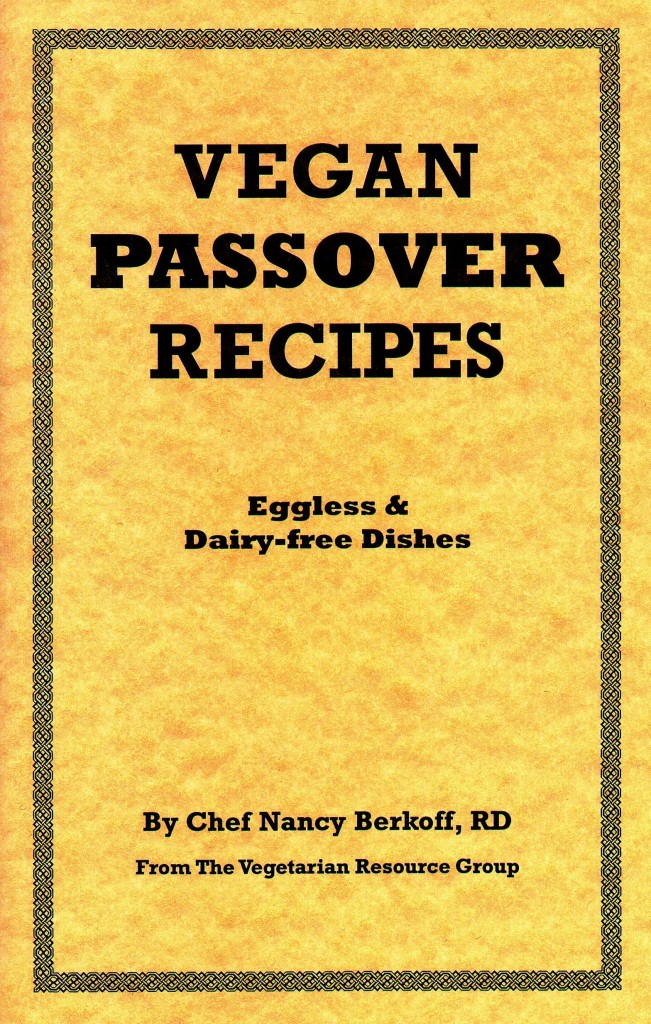Posted on
April 29, 2015 by
The VRG Blog Editor
By Reed Mangels, PhD, RD
Vegetarians, just like nonvegetarians, need to have reliable sources of vitamin B12. Reliable sources can include foods fortified with vitamin B12, foods that contain vitamin B12, and vitamin B12 supplements. Fortified foods – foods that have vitamin B12 added to them – include some brands of plant milks, some veggie meats, some breakfast cereals, some energy bars, some tofu, some nutritional yeast, and various other foods. Vegans can obtain their required B12 from just fortified foods, just supplements, or a combination of fortified foods and supplements.
Some vegetarians (not vegans) will choose to get vitamin B12 from animal sources, namely dairy products and eggs. Most multi-vitamins contain vitamin B12 and it is available as a stand-alone supplement also. To find out if a food is fortified with vitamin B12, check the nutrition label – added vitamin B12 will be indicated. If vegetarians’ vitamin B12 intake from food sources is adequate, supplements are not needed.
The table below shows the amount of vitamin B12 in some foods.
Table 1: Vitamin B12 Content of Foods1,2
| Food |
Vitamin B12 (micrograms per serving) |
Veggie
“meat analogs,” fortified, 1 oz |
1.0-3.0 |
Soymilk,
fortified, 1 cup |
1.2-2.9 |
Protein
bar, fortified, 1 bar |
1.0-2.0 |
Nutritional
yeast, Vegetarian Support Formula, 1 tbsp |
4.0 |
Marmite
yeast extract, 1 tsp |
0.9 |
Skim
cow’s milk, 1 cup |
1.22 |
Cheddar
cheese, dairy, 1 oz |
0.25 |
Egg,
1 large |
0.44
(equivalent to approximately 0.22 mcg due to lower absorption) |
Clearly, a person drinking 2 cups of fortified soymilk (2 x 1.2 =2.4 mcg) or choosing other fortified foods could achieve the levels of vitamin B12 recommended by the Dietary Reference Intakes (2.4 mcg/day is the RDA for an adult). The low amounts of vitamin B12 added to fortified foods helps with absorption; 60% of low dose (less than 5 micrograms) of vitamin B12 is absorbed.3
Lacto or lacto-ovo vegetarians may opt to use foods fortified with vitamin B12. They can also obtain sufficient vitamin B12 solely from dairy products (and eggs for lacto-ovo vegetarians). We need to consider 2 issues, namely, the vitamin B12 content of these foods and the absorption of vitamin B12 from these foods. The RDA for vitamin B12 is based on a 50% absorption.3 One study suggests that 65% of the vitamin B12 in cow’s milk is absorbed4 while absorption from eggs ranges from 24-36%.3
If we assume that vitamin B12 absorption from cow’s milk and other dairy products is similar to the average absorption of vitamin B12 from foods that is the basis for the RDA and that absorption from eggs is about half this, we can calculate whether or not dairy products and eggs can be successfully used to meet the RDA for vitamin B12.
Someone drinking 3 cups of cow’s milk (1.22 mcg of vitamin B12/cup) daily would meet the RDA for vitamin B12 (2.4 mcg/day for an adult). (3 x 1.22 mcg = 3.66 mcg). Two cups of cow’s milk would also suffice to meet the RDA.
1.5 cups of milk + 2 ounces of cheese (1.83 mcg + 0.5 mcg) would approximate the RDA. A combination of cow’s milk (and possibly eggs) and fortified foods selected, could also meet the RDA without the use of dietary supplements in the form of vitamin pills.
Of course, there is the consideration that adults aged 51 and older should obtain most of their vitamin B12 from foods fortified with vitamin B12 or a vitamin B12-containing supplement.3 This is a separate issue since it applies to all adults, not just vegetarians.
While several recent reviews5-7 have found a high prevalence of vitamin B12 deficiency in vegetarians, little information is available about dietary or supplement practices of these vegetarians. In areas of the world where vitamin A deficiency is common, we don’t emphatically state that vitamin A supplements are required; instead, we emphasize getting vitamin A from food sources. The same seems to be indicated for vitamin B12.
Some vegetarians (vegans, lacto or lacto-ovo vegetarians) may find that supplements are more convenient; others may prefer to use fortified foods. Vegetarians who use dairy products and/or eggs may prefer these sources. What’s important is to ensure that food or fortified food sources are reliable, are adequate, and are used on a daily basis.
If supplements are used, be aware that the amount absorbed is reduced, the higher the dose of the supplement. About 5% of the vitamin B12 in a supplement containing 25 mcg of vitamin B12 is absorbed.8-10 A lesser amount, 1% or less of the vitamin B12 in a supplement containing more than 100 micrograms of vitamin B12, is absorbed.3,9 Vegan registered dietitians Jack Norris, RD and Virginia Messina, MPH, RD recommend that if vitamin B12 supplements are used, you should take either a 25-100 microgram supplement once a day or a 1000 microgram supplement three times a week.11
For more information about vitamin B12, refer to Jack Norris, RD’s excellent webpage – Vitamin B12 – Are You Getting It?
References
1. U.S. Department of Agriculture, Agricultural Research Service. 2014. USDA National Nutrient Database for Standard Reference, Release 27. Nutrient Data Laboratory Home Page, http://www.ars.usda.gov/ba/bhnrc/nd
2. Mangels R, Messina V, Messina M. The Dietitian’s Guide to Vegetarian Diets, 3rd edition. Jones and Bartlett Publishers, 2010.
3. Institute of Medicine, Food and Nutrition Board: Dietary Reference Intakes for Thiamin, Riboflavin, Niacin, Vitamin B-6, Folate, Vitamin B-12, Pantothenic Acid, Biotin, and Choline. Washington, DC: National Academy Press, 1998.
4. Russell RM, Baik H, Kehayias JJ. Older men and women efficiently absorb vitamin B-12 from milk and fortified bread. J Nutr. 2001 Feb;131(2):291-3.
5. Pawlak R, Parrott SJ, Raj S, Cullum-Dugan D, Lucus D. How prevalent is vitamin B12 deficiency among vegetarians? Nutr Rev.2013 Feb;71(2):110-7.
6. Obersby D, Chappell DC, Dunnett A, Tsiami AA. Plasma total homocysteine status of vegetarians compared with omnivores: a systematic review and meta-analysis. Br J Nutr. 2013;109(5):785-94.
7. Pawlak R, Lester SE, Babatunde T. The prevalence of cobalamin deficiency among vegetarians assessed by serum vitamin B12: a review of literature. Eur J Clin Nutr. 2014 May;68(5):541-8.
8. Heyssel RM, Bozian RC, Darby WJ, Bell MC. Vitamin B12 turnover in man: the assimilation of vitamin B12 from natural foodstuff by man and estimates of minimal daily dietary requirements. Am J Clin Nutr. 1966;18:176–84.
9. Berlin H, Berlin R, Brante G. Oral treatment of pernicious anemia with high doses of vitamin B12 without intrinsic factor. Acta Med Scand. 1968;184:247–58.
10. Adams JF, Ross SK, Mervyn L, Boddy K, King P. Absorption of cyanocobalamin, coenzyme B 12, methylcobalamin, and hydroxocobalamin at different dose levels. Scand J Gastroenterol. 1971;6:249–52.
11. Norris J, Messina V. Vegan for Life. DaCapo Press, 2011.
The contents of this posting, our website and our other publications, including Vegetarian Journal, are not intended to provide personal medical advice. Medical advice should be obtained from a qualified health professional. We often depend on product and ingredient information from company statements. It is impossible to be 100% sure about a statement, info can change, people have different views, and mistakes can be made. Please use your best judgment about whether a product is suitable for you. To be sure, do further research or confirmation on your own.




